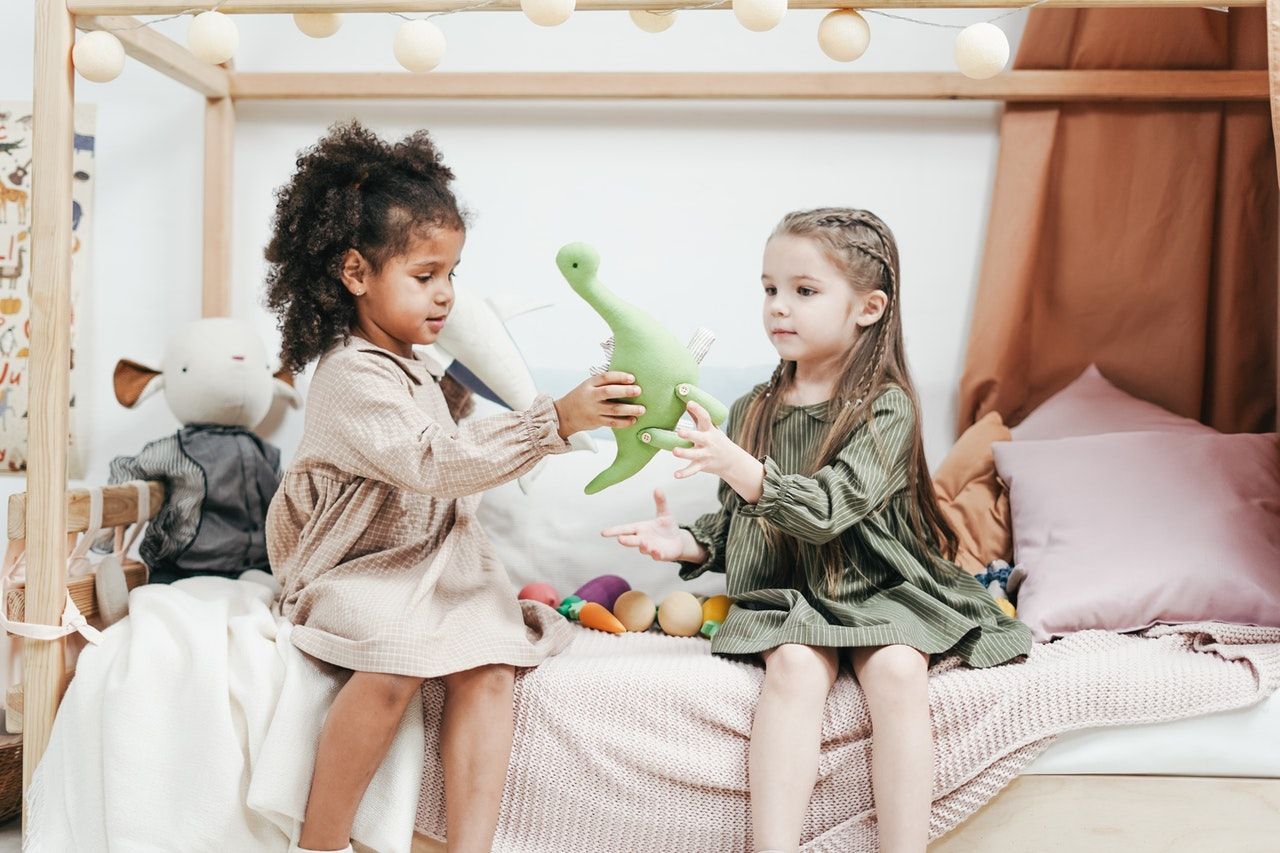How Does Morality Develop in Children & Why is it So Important?
Morality is an important social skill, but when do we actually develop it? It might be earlier than you thought!

Morality: the ability to tell right from wrong.1 Most of us probably strive to be moral people, but how do we define what is right and wrong? I think most of the world has been trying to figure that out since humanity began and mostly still are doing that every day. Most of us expect to live in a world where people do the right thing, where people act morally, but how do we learn this ability?
Like many life skills, morality develops in us very early in our life. In fact, scholars believe that the concept of morality emerges earlier in life than we think!2 There are many different theories about how morality develops in children and we’ve highlighted just a few below.
Theories of Morality
Piaget’s Theory
Swiss psychologist Jean Piaget’s theory of moral development in children is well known. He examined moral development in terms of the way that children think about right and wrong, rather than whether they acted in a manner that was considered right or wrong.3
Piaget described two main stages of moral reasoning in children. He proposed that between the ages of 5-9 years old, children develop moral realism; that is, they believe that morality is conducted by authority figures and breaking rules will lead to punishment.3 Children at this stage, according to Piaget, tend to judge right and wrong based on the actions of others and the trouble caused by their consequences, rather than the intention behind somebody’s actions.3
Alternatively, when children reach the age of 9-10 years old, they enter a stage called moral relativism; that is, children realize that morality is subjective to a situation and learn the ability to see a situation from another’s perspective.3 At this stage, children recognize that the intentions behind actions, in addition to the consequence of an action, matter for understanding what is right and wrong.3
Piaget essentially theorized that children go from recognizing right and wrong as an absolute, external force, to an internal reasoning that depends on circumstances.
Kohlberg's Theory
Lawrence Kohlberg, an American psychologist, expanded on Piaget’s theory by theorizing that there were 3 levels of moral reasoning.4 Similar to Piaget’s moral realism stage, Kohlberg believed that in the first level of moral understanding (which he called the preconventional level), morality comes from the outside.5 Children believe that the consequence of an action dictates the morality of it and this stage lasts till around 9 years old.5
The second level of morality emerges in most adolescents and adults and is called conventional morality. At this level, people have an internalized sense of right and wrong, but it is still dictated by social rules and authority is not questioned.5
The last and third level of morality theorized by Kohlberg is not achieved by everybody; in fact, he theorized that only 10-15% actually achieve this stage of moral understanding.5 In this stage people make up their own moral code based on universal ethical principles; these concepts are often abstract. Interestingly, Kohlberg’s theory highlights the importance of childhood in moral reasoning because he thought that to move up the stages of moral development, you have to properly conquer one stage at a time.4 This means that children would have to master the preconventional stage to move on.
Recent Theorists
The above two theories are famous for starting to look into the morality of children but recent theorists actually believe that the emergence of childhood morality begins much earlier than what is proposed above. Three recent researchers on this topic have proposed 3 different periods that morality begins to develop in children; proposing a range of ages between 2-7 years old.2 Ultimately, although they differ slightly on the exact ages, it is clear that researchers now believe that morality may develop far earlier than we have believed before.2
What Influences Morality Development in Children?
So, children develop morality very early in their life. But what actually influences what they think is right and wrong?

Parents
Unsurprisingly, parents play a big role in what children think is moral. A recent study from the University of Chicago lays out that early moral development in kids could be shaped by how their parents react to others’ feelings.6 While children were viewing a ‘good’ and ‘bad’ character on screen, researchers saw that there was a distinct brainwave that corresponded to the parent’s view of justice.7 They believe that a parent’s sensitivity towards injustice could shape their children’s judgement even at 12-24 months of age.7
Culture
The role of culture in determining the morality of children is a complicated one. On one hand, our cultures shape our lives because they determine the kind of society we live in, and the kinds of laws that we are meant to abide by. This means that our societies are different wherever we are in the world, and there are researchers that support the idea that morality changes because of our culture.8 However, there are also scientists that believe that certain concepts of fairness and ethics are universal.8 While there is no definitive answer, it is clear that culture shapes children’s morality because it plays a role in outlining what is right and wrong and is a force that children are exposed to from their very first minute of life.
Formal Education
It’s also not hard to see why formal education would be a big influence in shaping children’s morality. School is likely the first place outside of the house that children will encounter strict rules and authority figures that can directly punish them. There is interesting new research which might suggest that morality could develop differently in different types of schools.9 For example, a study of 100 children between 9-12 years in Pakistan found that children from private schools had a higher tendency for forgiveness compared to public school children.9
This type of research is ongoing and is trying to understand how different factors can impact children’s moral development so that they can become the best versions of themselves and learn right from wrong. In fact, we have researchers recruiting for studies that are trying to understand children’s social understanding on our site right now!
Honeybee
Connects the community with research. Honeybee is a web and mobile app to participate in research, discover yourself, and earn cash and rewards.
References
1. Definition of MORAL. Accessed July 14, 2021. https://www.merriam-webster.com/dictionary/moral
2. Turiel E. Moral Development in the Early Years: When and How. HDE. 2018;61(4-5):297-308. doi:10.1159/000492805
3. Piaget’s Theory of Moral Development | Simply Psychology. Accessed July 14, 2021. https://www.simplypsychology.org/piaget-moral.html
4. Moral Development - symptoms, stages, Definition, Description, Common problems. Accessed July 14, 2021. http://www.healthofchildren.com/M/Moral-Development.html
5. Kohlberg’s Theory of Moral Development | Simply Psychology. Accessed July 14, 2021. https://www.simplypsychology.org/kohlberg.html
6. How Parents Influence Early Moral Development. Greater Good. Accessed July 14, 2021. https://greatergood.berkeley.edu/article/item/how_parents_influence_early_moral_development
7. Cowell JM, Decety J. Precursors to morality in development as a complex interplay between neural, socioenvironmental, and behavioral facets. PNAS. 2015;112(41):12657-12662. doi:10.1073/pnas.1508832112
8. Influences on Moral Development | Adolescent Psychology. Accessed July 14, 2021. https://courses.lumenlearning.com/adolescent/chapter/influences-on-moral-development/
9. Javed A, Kausar R, Khan N. Effect of School System And Gender on Moral Values and Forgiveness in Pakistani School Children. 2(4):12.

